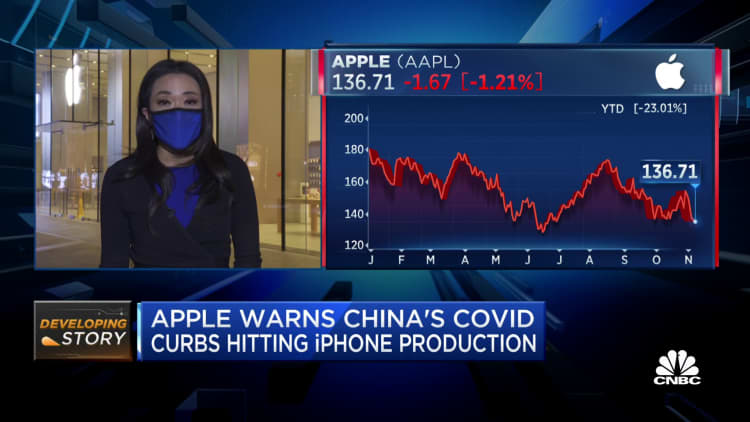Crowds of people in the southern Chinese city of Guangzhou crashed through Covid barriers and marched down streets in chaotic scenes on Monday night, according to videos posted online, in a show of public resentment over coronavirus curbs.
Among the latest outbreaks in China, Guangzhou's is the largest, with new daily infections of Covid-19 topping 5,000 for the first time and fueling speculation that localized lockdowns could widen.
Videos widely shared on Twitter showed noisy scenes in Guangzhou's Haizhu district of people charging down streets and remonstrating with white hazmat-suit-clad workers.
Twitter is blocked in China, and several hashtags related to the topic of "riots" in the area were scrubbed from China's Twitter-like Weibo by Tuesday morning.
Neither the Guangzhou city government nor the Guangdong provincial police responded to Reuters' requests for comment.
"It was quite tense out there last night. Everyone made sure their doors were locked," said a Guangzhou resident who uses the name Chet and lives about a kilometer from where the protest took place. He said local chat groups and social media feeds had been flooded with videos and pictures of the episode.
"When it happened so close to me I found it really upsetting. I couldn't sleep last night after watching those images," said Chet, whose residential compound has been locked down for about 20 days.
On Tuesday, China reported 17,772 new local Covid-19 infections for Nov.14, up from 16,072 a day earlier and the most since April, even as many cities scaled back routine testing after authorities announced measures last week aimed at easing the impact of heavy coronavirus curbs.
In the capital Beijing, new infections hit a record 462 for Monday. Major cities including Chongqing and Zhengzhou were among the worst-hit.
Still, China is scrambling to limit the damage of its zero-Covid policy nearly three years into the pandemic, as the latest in a spate of dismal economic reports showed retail sales fell in October and factory output grew more slowly than expected.
While many residents have expressed guarded optimism after Friday's announcement that some of the stringent Covid policies would be eased, concerns grew this week over the worsening outbreaks and there was confusion as some cities halted or adjusted regular testing.
Zero-Covid fatigue
Monday night's scenes from Guangzhou were the latest outpouring of frustration over Covid curbs that have triggered frequent lockdowns and enforced quarantines under a signature policy of President Xi Jinping that China argues saves lives.

Last month, a Covid outbreak at a massive Foxconn plant that makes Apple iPhones in Zhengzhou sparked chaos, with many workers fleeing, including by climbing fences, hobbling production.
Officials in Guangzhou, home to nearly 19 million people, said they plan more makeshift hospitals in addition to the six that have been built that have 20,000 beds, mainly for observation of infected people without symptoms.
"The infection curve of Guangzhou is tracking the pace of Shanghai's March-April outbreak, raising the question of whether a city-wide lockdown will be triggered," JPMorgan analysts wrote, referring to Shanghai's two-month lockdown this year, which sparked widespread unrest.
"It would become a testing point regarding the government's determination to push for the relaxation of Covid control measures," they said.
JPMorgan estimated that cities with more than 10 new cumulative cases in the past week are home to 780 million people and account for 62.2% of GDP — roughly triple the levels seen at the end of September.
Testing times
Under China's new rules, testing efforts are to be more targeted, easing a significant financial burden on cities.
On Monday, Beijing's most populous district of Chaoyang moved some testing sites closer to residential compounds.

While that increased the number of sites, it also led to long waiting times for many, fueling frustration, as many workplaces require negative test results from within 24 hours.
On Weibo, a hashtag on testing booth closures was flooded with critical comments on Monday night before being censored: "What are working people supposed to do?" wrote one Weibo user. Another asked: "What kind of brain came up with this policy?"
On Tuesday, officials said Chaoyang was adding more testing sites, including near offices. The city also barred visits to homes for the elderly.
'Why is our building shut?'
Friday's easing moves sparked a market rally on hopes that China is signaling plans to end a policy that has all-but-shut its borders and caused frequent lockdowns, possibly starting after the annual session of parliament in March.
But experts warn that full reopening requires a massive vaccination booster effort, and would also need a change in messaging in a country where Covid remains widely feared.
In Shanghai, which has been reporting relatively low infection numbers, including 16 for Monday, apartment blocks were still being sealed off and the Shanghai Disney Resort has been shut since Oct. 31 after a visitor tested positive.
While the central government has urged a more flexible approach to controlling outbreaks, local authorities still have leeway to lock down buildings they assess as high risk
"The rules are very clear, so why is our building shut?" asked a Shanghai retiree whose building was sealed off with tape on Monday morning after a "close contact" was taken away and placed in quarantine.

